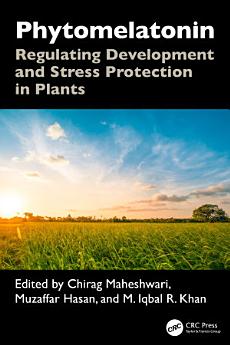Phytomelatonin: Regulating Development and Stress Protection in Plants
About this ebook
The book offers a unique synthesis of molecular, physiological, and applied perspectives, making it the most comprehensive resource available on phytomelatonin’s role in plant science. It highlights the molecule’s potential in addressing pressing agricultural challenges such as climate-induced stress, reduced soil fertility, and the need for sustainable farming approaches.
Key Features:
- Covers the biosynthesis, metabolism, and transport of phytomelatonin in various plant species
- Details its regulatory role in seed germination, root architecture, flowering, fruiting, and senescence
- Explains its interaction with key phytohormones under stress conditions including drought, salinity, and extreme temperatures
- Presents recent advances in phytomelatonin-mediated gene expression and redox homeostasis
- Discusses field applications including melatonin seed priming, foliar sprays, and soil drenching to improve stress resilience
- Integrates insights from molecular biology, crop physiology, and natural farming practices
This book is an essential reference for researchers, graduate students, and professionals in plant biology, crop science, and environmental stress physiology. It serves as a foundational text and a forward-looking guide for those seeking to harness phytomelatonin in building climate-resilient and sustainable agriculture.
About the author
Chirag Maheshwari serves as a scientist at the Division of Biochemistry, ICAR-Indian Agricultural Research Institute located in New Delhi. His present research pursuits encompass the exploration of both physiological and molecular mechanisms that underlie abiotic stress in plants. Additionally, he is engrossed in analyzing crop nutritional profiles when subjected to stress conditions. He boasts a publication record of approximately 20 research and review articles in esteemed, peer-reviewed international journals, alongside over twenty contributions to book chapters. Furthermore, his accomplishments have been recognized with several accolades, including the Young Scientist Award from SPBB in collaboration with Springer, Best Poster Award, and others. He has published numerous peer-reviewed research articles, book chapters, and popular articles, and continues actively contributing to scientific advancements. They remain deeply committed to promoting sustainable agriculture through innovation and research.
Muzaffar Hasan is a Scientist at ICAR-Central Institute of Agriculture Engineering, Bhopal, India. He received his B.Sc. degree from the G. B. Pant University of Agriculture and Technology, Uttarakhand, India, and his M.Sc. and Ph.D. from the Indian Agricultural Research Institute, New Delhi, India. He began his scientific career in the Agro Produce Processing Division at ICAR-CIAE, Bhopal 2016, and moved to the Centre of Excellence on Soybean Processing and Utilization at ICAR-CIAE, Bhopal, in 2022. During his 8 years at ICAR-CIAE, Bhopal, he taught courses ranging from basic biochemistry to food processing. His initial research focused on the phytochemical extraction from agricultural wastes, ranging from dietary fiber to anthocyanins. In 2022, his research switched to the CRISPR/Cas-based genome editing of microbes to enhance the high-value compound extraction. His honor includes the Young Scientist Award. He is also associated with prestigious societies like the Society of Plant Biochemistry and Biotechnology (SPBB), and the Association of Food Scientists & Technologists, India (AFSTI).
M. Iqbal R. Khan currently holds the position of Assistant Professor at the Department of Botany, and Deputy Director of the Centre for Environment and Sustainable Development (CESD), Jamia Hamdard, New Delhi. Also, an Adjunct Professor at the Korea University, Seoul, South Korea and Adjunct Associate Professor at The University of Western Australia, Perth, Australia.
He has published more than 100 articles, edited 10 Books, and authorized 14 Book Chapters in reputed publications. He has an h-index of 52 and i10-index of 93, with more than 12000 citations to his credit as per Google Scholar as per bibliometric data in Jan 2025. Recognized as Clarivate Highly Cited Researcher in Animal and Plant Science category. He has been recognized in the list of Top 2% Scientists (Elsevier) of the World (2021-2024). He has been awarded with The National Academy of Sciences (NASI) - Membership in Plant and Agricultural Sciences (2024), and by the program for Indian National Science Academy (INSA) Young Associates (2024). Further, his work has attracted prestigious awards, including R.H. Dastur Gold Medal Award-ISPP (2023), Young Scientist Platinum Jubilee Award-NASI (2021), and Young Scientist Award-ISPP (2018).
He is on the Editorial Board of many renowned journals as the Section Editor in Plant and Soil, and Associate Editor in Journal of Plant Growth Regulation, 3-Biotech, and Plant Physiology Reports. He has also served as Guest Editor for Agriculture, Frontiers in Plant Science, Sustainability and Plant Physiology and Biochemistry journals.






